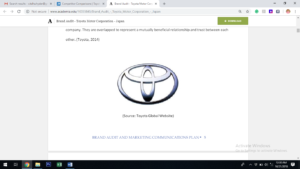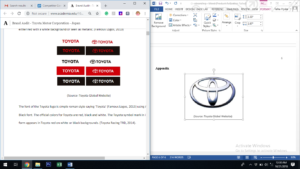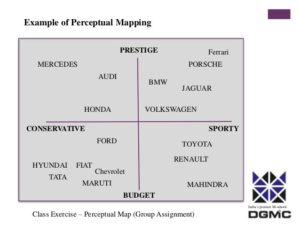This assignment is to be completed as a group. It comprises of a critical analysis of brand as a reflective essay. It will access students’ Discipline Knowledge, Communication Proficiency, Information Literacy and Problem-solving Skills. Groups should first select an automotive brand (TOYOTA) they will work on undertake a comparative analysis of brand audit and develop a detailed assessment of brand values and position mapping of the brand vs. competing brands. The basis of existing brand equity should be identified as well as the use being made of brand elements. Next each group should critically evaluate the current situation for the brand and provide well-reasoned and supported analysis of brand program and strategy recommendations to achieve the identified brand marketing goals. The assignment should be submitted in business report format (i.e. executive summary, table of contents, headings and subheadings and appendices.)
Brand Equity
Kiichiro Toyota founded this company back in 1934. The company was manufacturing an engine in its initial years. Then it started manufacturing the AA car in 1936. As the company grew, it acquired some other companies such as Hino, Daihatsu, Isuzu and others. Toyota has its head office in Tokyo, Japan.
Toyota is a renowned name in the automobile sector. It has different types of cars varying from the category of 500 CC to 1800 CC and above. Toyota has a range of medium-sized cars and luxury cars. In addition to the automobile sector, Toyota also provides other financial services too such as financial services through its financial division (Kent, 1983).
Brand Equity is an essential tool for companies to assess long-term brand love, and to assess how much people prefer the company and its products. The calculations of the brand equity might be difficult but it is a very good tool to assess how much potential the business and the brand has.
Brand Equity is basically a financial figure that tells the entrepreneur and the marketer how much revenue the business will generate and the net present value of the brand. For example, if I am a consumer and I can buy 4 Toyota Cars in my entire life as if each car costs 1 million dollars, the total amount will become 4 million dollars. Then the brand managers and financial analysts will apply a discounted rate to calculate the net present value of the 4 million dollars to find out the actual revenue that is generated form one customer.
This what the equity is calculated for all customers, or for a sample of customers. Then the sum is taken as the actual, calculated analysis of brand equity for the specific brand.
The brand equity of a brand such as Toyota depends on many extraneous and internal factors. David Jobber (2003) states that the brand equity of Toyota is impressive. Brand equity depends on brand loyalty and brand love.
The brand loyalty of the company is strong as a result of which the sales were high. Toyota has the main focus on efficiency and on the cutting of costs. This is also increasing its value (Kent, 1983). In figures, the brand equity of Toyota was 42,392 million dollars in 2014 and it shows the competitiveness of the brand.
Brand equity is the final frontier but it is built on many factors. These factors are important for building the strategy for analysis of brand and its image that eventually creates value for the customers, and increases the equity value of the brand.
The branding of Toyota is impressive and the company has worked a lot on brand building. Toyota has a proper logo. There are 3 ovals in the logo and they are symmetrical and are combined together to form an emblem. It shows the trust and relationship that the company aims to build with the customers and clients.
Moreover, the brand equity of Toyota is consistent for a long time because the company has lived by certain values and beliefs, and they kept customers at the core. Toyota has 6 brand values. They are as follows:
Dependability: This states that Toyota is a highly rated company as compared to other automobiles.
Quality: Toyota has won many awards on the basis of quality.
Reliability: Toyota is very efficient in terms of fuel consumption and maintenance.
Safety: Toyota has won many safety awards and it puts the safety of the customer at first preference.
Innovation: Toyota is led by innovation and it has the highest number of hybrid cars on the road.
The brand equity of a company is shaped by the strengths the company has. There are chances that the brand equity may increase or decrease due to the strengths and weakness of that firm. Toyota is a century-old manufacturer of cars, and they have certain strengths. The brand equity of Toyota is higher than its competitors because of various reasons.
First of all, Toyota cars are long-lasting and do not depreciate soon. It has good quality and this is why people buy it for a long duration. Secondly, As Toyota has good features and traits it has a good resale value.
When the user wants to sell the car, he can get a good price for it. The maintenance cost of the car is low. This is a fuel-efficient car and the parts are also easily available. Toyota makes environmentally friendly cars. This means they are sustainable and do not pollute the environment as other cars do. Lastly, the brand equity of Toyota gets higher when it made in America. America is a country known for the latest technology and innovations.
The brand equity of Toyota is likely to be negatively associated with certain things, and it can reduce its brand equity too. Toyota has certain weaknesses too which can directly hit the brand equity of the brand. Toyota has a stigma attached that it makes low costs cars for middle-class people.
Toyota is unable to compete in the luxury cars sector and it is not enabling it to enter the niche market. This is an issue that Toyota is facing. Also, Toyota is facing higher operating costs in the USA. To keep the prices of cars lower they use underage workers in Asian countries which affects their reputation as well (Spear, 2004).
Brand equity is an essential tool for assessing long-term brand love and association. The higher the brand equity, the more competitive the brand is. Toyota has strong brand equity because it faces lesser competition, or we can say it is highly competitive. Toyota faces competition from other competitive automobile manufacturers too.
These include Nissan, Honda, Chevrolet, and Audi, etc. Toyota is a good choice in the car because it is made in the USA and it has better functionality as compared to other brands. It has a range of cars with different features. This is why it is not easy to compete with Toyota. The 2018 models of Toyota are very under friends and are innovative too, which gives the user a good experience (Spear, 2004).
The brand equity of Toyota is better than the competitors and it shows that the company is more likely to engage and hook the customers for generations to come. Toyota is the brand that is preferred by the people and it is under the headline for a long time.
It has launched new cars and particularly electric and hybrid cars which have further strengthen the brand equity. It has placed consumers at the center. It has maintained a track record of good quality for decades. It is capable of making good cars with great workmanship (Kent, 1983) .
References
gaussian.com, 2016. Gaussian 09 Citation. [Online]
Available at: http://gaussian.com/g09citation/
[Accessed 25 10 2018].
Kent, W., 1983. A simple guide to five normal forms in relational database theory. Communications of the ACM, 26(2), pp. 120-125.
Morgan, J. M. &. & Liker, J. K., 2006. The Toyota product development system (Vol. 13533). New York: Productivity Press.
Spear, S. J., 2004. Learning to lead at Toyota. Harvard business review, 82(5), pp. 78-91.
Appendix


Source: Toyota Global Website



